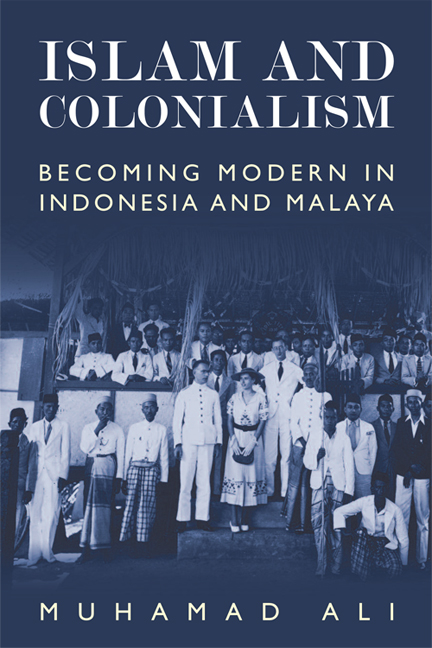Book contents
- Frontmatter
- Contents
- Glossary
- Acknowledgements
- List of Abbreviations
- Transcriptions and Orthography
- Map
- Introduction
- Part I Making Islam Modern
- I Organising Da'wah and Spreading Reform
- II Colonising the Muslim East and Reinforcing Culture
- Part II Modernising Politics and Government
- Part III Modernising Law
- Part IV Modernising Education
- Conclusion
- Bibliography
- Index
I - Organising Da'wah and Spreading Reform
from Part I - Making Islam Modern
Published online by Cambridge University Press: 05 September 2016
- Frontmatter
- Contents
- Glossary
- Acknowledgements
- List of Abbreviations
- Transcriptions and Orthography
- Map
- Introduction
- Part I Making Islam Modern
- I Organising Da'wah and Spreading Reform
- II Colonising the Muslim East and Reinforcing Culture
- Part II Modernising Politics and Government
- Part III Modernising Law
- Part IV Modernising Education
- Conclusion
- Bibliography
- Index
Summary
Although we are divided into nations, we human beings are one. In order for us all to live in prosperity and happiness we should unite our hearts… and should try something new and different, instead of merely following our own customs.
(Dahlan cited in Mulkhan 1986: 7–9)I became very eager and hoped that in this Malay Peninsula there would be a journal, a magazine, or a newspaper owned by the people of our country, which would wisely command us to gather together and unite in all tasks to bring about public goodness [maslaha] to the country [watan], the community [bangsa], and the religion [agama].
(Kenali 1918: 2)The da'wah movements that emerged in the late nineteenth century and in the early twentieth came in the wake of the decline of the Ottoman Empire and attempts by the Wahhabi Saudi Government to become the new caliph of the Muslim world.1 Muslims in the Indonesian-Malay world were exposed to these issues and the concept of reform or tajdid through their engagement with intellectual networks in Mecca and Cairo and by interaction through the Indonesian-Malay world. When the Ethical Policy was instituted in 1901, an increasing number of Indonesian-Malay Muslim students and pilgrims had been involving themselves in the call for cultivation and renewal of Islam. Upon returning home, Muslims from all over the Indonesian-Malay world preached and taught in mosques and pesantren or pondok schools where they encountered very low levels of literacy and understanding of various branches of Islamic knowledge. Regarding themselves as part of a globally imagined ummah, they were soon dissatisfied with the number of people they could reach by teaching in mosques or in their homes. Having decided that a pan-Islamic caliphate would be ultimately unfeasible, they began to coordinate their activities, create organisations (A. jam'iyyah) and publish sermons and articles for newspapers and periodicals in order to further the objectives of reform.
Muslims who had travelled abroad to study or to make the pilgrimage were not necessarily from privileged backgrounds, but the status that they acquired through study at prestigious institutions overseas gave many the opportunity to preach and teach Islam. A number of the returning students and pilgrims published their ideas in foreign and local languages in newspapers and periodicals that were now available due to technological innovation that came with colonialism.
- Type
- Chapter
- Information
- Islam and ColonialismBecoming Modern in Indonesia and Malaya, pp. 35 - 73Publisher: Edinburgh University PressPrint publication year: 2015



